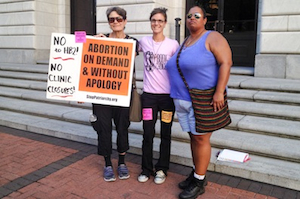NEW ORLEANS — A federal appeals court in New Orleans is reviewing whether 11 clinics that provide abortion in Texas must immediately close their doors because they don’t comply with a state law requiring that they meet all the standards of an outpatient surgical center.
A three-judge panel heard arguments this morning for more than 90 minutes, first from the Texas solicitor general and then from a lawyer with the Center for Reproductive Rights, representing many of the Texas clinics. The questions from the judges centered mainly on what constitutes an “undue burden” when a woman is trying to get an abortion, and what fraction of Texas women would be affected.
Advocates say that about 20 abortion clinics in Texas have already closed in advance of the law; if the court rules in Texas’s favor, fewer than 10 clinics that provide abortion would remain in a state with a population of 26 million.
Both sides agreed that if the 11 clinics close, women in the Rio Grande Valley would have to travel more than 200 miles to San Antonio to get an abortion under the new law. But Jonathan Mitchell, the Texas solicitor general, said there was no good evidence that women weren’t figuring out how to deal with that and no evidence that if the abortion rate in Texas had fallen, that it was related to the law.
“An abortion law cannot be enjoined based on conjecture,” Mitchell said. Judge Jennifer Elrod questioned him about a clinic’s survey of 20 patients presented at the trial in August. An expert testifying for the clinics said one patient surveyed said she did not get an abortion after the law, known as HB2, went into effect.
“He did not report she was unable to get it, he did not report she encountered an undue burden,” Mitchell answered. “She could simply have changed her mind.”
Furthermore, patients in El Paso, where another clinic might close because it is not an ambulatory surgical center, could just travel to New Mexico for an abortion, Mitchell added.
Stephanie Toti with the Center for Reproductive Rights argued on behalf of affected clinics such as Whole Woman’s Health. She says lots of evidence was presented at the trial last month that women were facing numerous burdens exercising their constitutional right to an abortion. For example, a San Antonio clinic had offered women in the Rio Grande Valley who were seeking abortions free bus passes to help them travel north. But the patients told the clinic it wasn’t just the distance and money, but the problems with child care, time off work, and explaining to family why they were going so far.
Toti said a promontora, a health outreach worker, testified at the trial that women were experiencing obstacles due to the clinics closing in Rio Grande Valley. “She says she personally observed women turning to illegal means to get an abortion,” Toti told the judges.
In a rebuttal, Mitchell called that testimony “vague” and says the promontora couldn’t give specific numbers of women doing that and couldn’t provide evidence that those choices were related to the effects of HB2.
The three judges did not indicate when they would decide, but if the decision goes for state of Texas, the clinics would probably close immediately. The judges could also decide that some of the most isolated clinics could remain open, while others must close.
Federal district Judge Lee Yeakel ruled in August that the surgery center regulation had no health benefit and would place numerous burdens on women seeking care, especially if they lived in the Rio Grande Valley and west Texas. Yeakel allowed the non-complying clinics to remain open, but the state asked for an emergency motion to overrule that and close them. The three judges did not indicate when they would decide.
Mitchell told the panel the state of Texas has a compelling interest in closing clinics that it deems unsafe, and that’s why the state sought an emergency motion to stay Yeakel’s decision.
“If there is a Kermit Gosnell-type clinic in a state, and that’s the last clinic in the state, I think everyone could agree that clinic could be shut down,” Mitchell said, referring to a notorious abortion doctor convicted of murder in Philadelphia.
Outside the hearing, reproductive rights protesters carried signs.
Bethany Van Kampen, a recent law school graduate and a board member of the New Orleans Abortion Fund, attended the hearing. She said it seemed that the judges were asking very hard questions of Toti.
“It’s a bit discouraging,” she said. “It felt very targeted. I felt our line of questioning was harder and more difficult, and I think we tried to do our best.”
Sandy Jones, an activist with Stop Patriarchy, traveled from Houston to attend. She said it seemed the judges had too narrow of a focus.
“These are forces that are determined to criminalize every abortion, every woman and make it inaccessible to every woman,” Jones said. “And birth control as we know is not far behind. This is a war on women; this is a state of emergency.”
Abortion opponents had also traveled from Austin and Fort Worth to listen.
“It’s hard to say how this will go,” said Emily Horne, a legislative associate for Texas Right to Life.
She said there was a need for Texas to seek this emergency hearing to shut down the non-complying clinics right away. “It is a direct safety measure for the health and safety of Texas women, so we think that sooner is better to implement that,” Horne said.
Horne said it was exciting to be there, and important for all states, not just Texas.
“Texas is definitely setting some precedents as far as what states are being allowed to pass, so there is a lot that does hinge on this,” she added.







